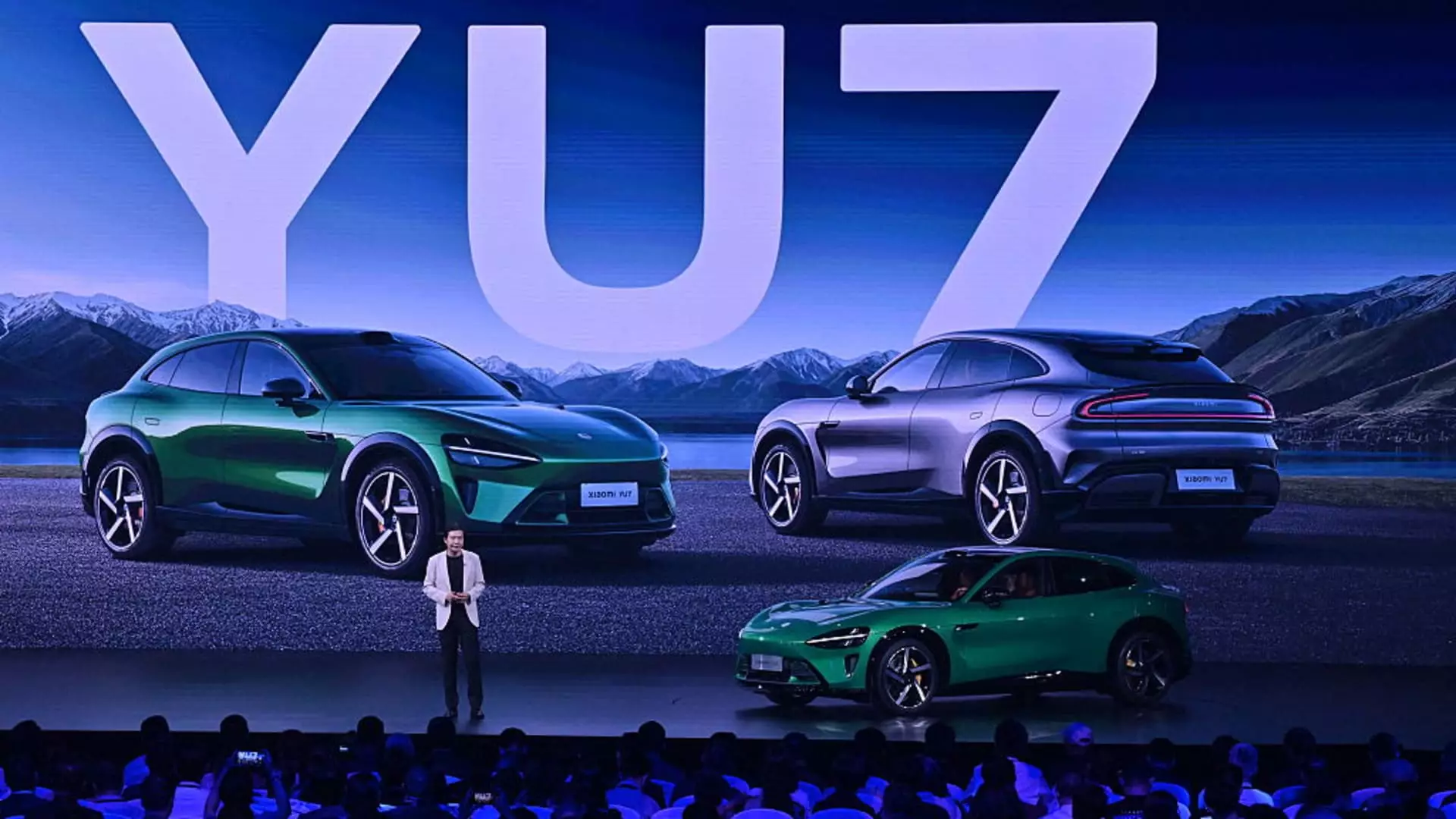The landscape of electric vehicles (EVs) has witnessed a seismic shift with China’s smartphone giant Xiaomi now firmly entering the battleground against established players like Tesla. With the unveiling of its new YU7 SUV, Xiaomi is not merely treading water; it’s diving into the depths of a fiercely competitive market that has long been dominated by the American titan’s Model Y. This brave leap into the electric vehicle sector represents not only a departure from Xiaomi’s traditional domain but also a testament to its ambitions of transforming the automotive industry.
For consumers wary of the incessant struggle with charging infrastructure, the YU7 boasts a remarkable driving range of 760 kilometers (approximately 472 miles) on a single charge. This impressive specification even surpasses Tesla’s own offering for the Model Y, which claims a range of 719 kilometers. It’s a point of contention in an industry where minute differences can translate to significant competitive advantages. Xiaomi’s strategy appears straightforward: provide consumers with a vehicle that alleviates their range anxiety while positioning it squarely in price competition against luxury models like Tesla.
The Price War: A Game of Strategic Positioning
Xiaomi plans to price the YU7 between 250,000 yuan and 320,000 yuan (approximately $34,700 to $44,420), directly challenging the starting price of Tesla’s Model Y, which is currently set at 263,500 yuan. The pricing strategy is telling; it suggests a calculated bet that showcases not only Xiaomi’s intention to capture market share but also the potential to reshape consumer expectations in the luxury SUV segment. Analysts predict robust monthly sales figures—around 30,000 units—indicating a confidence that the YU7 could indeed carve a significant slice out of Tesla’s market presence in China.
While Xiaomi’s ambition might not raise a corporate eyebrow in the fast-paced world of tech, it’s critical to recognize how vulnerable Tesla could become in this fierce showdown. The battle for the luxury EV market is heating up, and if Xiaomi’s sales forecasts hold true, we may witness a seismic shift in the balance of power.
Challenges Ahead: Safety and Public Perception
However, Xiaomi’s ambitious foray into the EV market is not without hurdles. The public’s trust, significantly bolstered by safety records, remains a challenging hill to climb, especially in light of past incidents that have shaken consumer confidence. A tragic crash involving its inaugural model, the SU7 sedan, which resulted in loss of life, underscores the necessity for stringent safety measures. The fallout has led Chinese regulatory bodies to enforce stricter guidelines on how automakers advertise their driver-assist technologies, shaking the foundations of a marketing strategy that leans heavily on tech prowess.
Xiaomi’s quality assurance will be scrutinized like never before as it attempts to position the YU7 as a luxury offering. Their trajectory already paints a picture of stability; the SU7 has successfully delivered over 28,000 units within just a month. But, as the saying goes, one good month does not a trend make. Moving forward, overcoming the shadow of safety concerns will be critical if Xiaomi aspires to be a reputable name in the automotive sector.
Future Dynamics: The EV Landscape Is Shifting
What excites many is the overarching notion that Xiaomi’s entry could fortify competition in the electric vehicle market, compelling established players like Tesla to not only innovate but also refine their pricing strategies. Such an environment benefits consumers. With Xpeng also gearing up to reveal its upgraded model, the stage is set for a thrilling race where consumer choices expand, and innovation accelerates.
Xiaomi’s dual focus on technological excellence in smartphones paired with a newly launched electric vehicle could well create a virtuous cycle of innovation that is both refreshing and necessary. Observers like Citi analyst Jeff Chung predict that Xiaomi’s rise could meaningfully erode Tesla’s share in China—a cold wake-up call for a company that has, until now, enjoyed the comforts of dominance. The future unfolding before us suggests a democratization of choice in the EV space; whether this will translate into a bustling market thriving on diversity, however, remains to be seen.
Surging forward, Xiaomi’s YU7 may signify a broader trend of tech spillover into new domains—an exciting prospect for both consumers and the industry. We live in a time where the lines blur between technology and transportation, setting the stage for a transformative shift that could redefine our relationship with the automobile altogether.


Leave a Reply